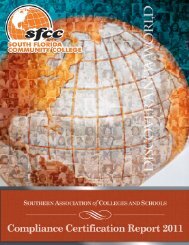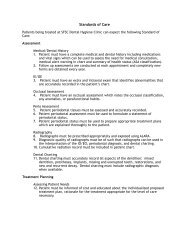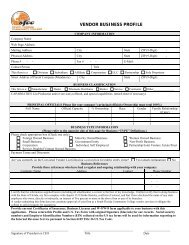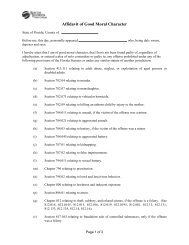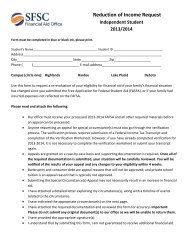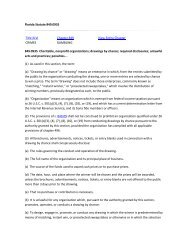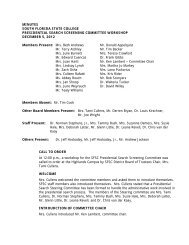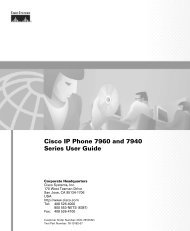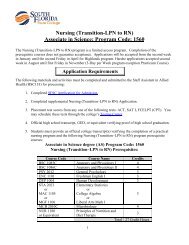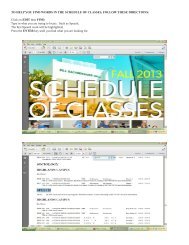2011-12 College Catalog - South Florida State College
2011-12 College Catalog - South Florida State College
2011-12 College Catalog - South Florida State College
Create successful ePaper yourself
Turn your PDF publications into a flip-book with our unique Google optimized e-Paper software.
sfcc<br />
D. Court Subpoena -<br />
1. Information will be released upon receipt of a<br />
subpoena presented by a court of competent<br />
jurisdiction.<br />
2. Prior to release of the information, the<br />
custodian will notify you by certified letter of<br />
the information requested by the court. (NOTE:<br />
The college is not required to give you prior<br />
notice when responding to a federal Grand Jury<br />
subpoena or other law enforcement subpoena<br />
that requires that you not be informed of the<br />
existence of the subpoena.)<br />
E. <strong>State</strong> of <strong>Florida</strong> Public <strong>College</strong>/University - Limited<br />
access records will be released to another public<br />
college or university in the state of <strong>Florida</strong> on written<br />
or electronic request.<br />
F. Emergency - Information may be released to proper<br />
authorities when needed to protect the life, health,<br />
or safety of you or other persons.<br />
XI. Amendment of Educational Records<br />
You have the right to request to have an education record<br />
corrected that you believe is inaccurate, misleading,<br />
or in violation of your privacy rights. The following are<br />
procedures for correction of these records:<br />
A. You must submit a written request to the SFCC<br />
registrar to amend a record. You should identify the<br />
part of the record you want changed and specify<br />
why you believe it is inaccurate, misleading or in<br />
violation of your privacy or other rights.<br />
B. SFCC may or may not comply with the request. The<br />
registrar will notify you of the decision. If the college<br />
decides not to comply, the registrar will advise you of<br />
your right to a hearing to challenge the information<br />
believed to be inaccurate, misleading, or in violation<br />
of your rights.<br />
C. Upon request, SFCC will arrange for a hearing,<br />
and notify you, reasonably in advance, of the date,<br />
place, and time of the hearing.<br />
D. The hearing will be conducted by a hearing officer<br />
who is a disinterested party; however, the hearing<br />
officer may be an official of the institution. You shall<br />
be afforded a full and fair opportunity to present<br />
evidence relevant to the issues raised in the original<br />
request to amend your education record. You may<br />
be assisted by one or more individuals, including<br />
an attorney.<br />
E. SFCC will prepare a written decision based solely on<br />
the evidence presented at the hearing. The decision<br />
will include a summary of the evidence presented<br />
and the reasons for the decision.<br />
F. If SFCC decides that the challenged information<br />
is not inaccurate, misleading or in violation of your<br />
right of privacy, it will notify you that you have a right<br />
to place a statement in the record commenting on<br />
the challenge information and/or a statement setting<br />
forth reasons for disagreeing with the decision.<br />
G. The statement will be maintained as a part of your<br />
education records as long as the contested portion<br />
is maintained. If SFCC discloses the contested<br />
portion of the record, it must also disclose the<br />
statement.<br />
H. If SFCC decides that the information is inaccurate,<br />
misleading, or in violation of your right of privacy,<br />
it will amend the record and notify you, in writing,<br />
that the record has been amended.<br />
XII. Right to File a Complaint<br />
If you feel that your right to privacy under FERPA has<br />
been violated, you may file a complaint with the U.S.<br />
Department of Education. The complaint must be filed<br />
within 180 days of the date of the alleged violation or of<br />
the date that you knew or reasonably should have known<br />
of it. To file a complaint, you shall contact:<br />
XIII. Code of Conduct<br />
Family Policy Compliance Office<br />
U.S. Department of Education<br />
400 Maryland Avenue, SW<br />
Washington, DC 20202-4605<br />
(202) 260-3877<br />
When you are admitted to SFCC, you are subject to the<br />
jurisdiction of the college during your enrollment. As a<br />
member of the college community, you are expected<br />
to act responsibly in all areas of personal and social<br />
conduct. You are responsible for the observance of all<br />
SFCC District Board of Trustees’ policies and procedures<br />
as published in the catalog, the Student Handbook, and<br />
other college information bulletins. Violation of any of<br />
these rules may lead to disciplinary action in accordance<br />
with prescribed procedures for the handling of disciplinary<br />
cases and may range from reprimand to expulsion from<br />
the college. See details on conduct and due process in<br />
the current student handbook.<br />
XIV. Freedom of Inquiry and Expression<br />
Students and student organizations are free to examine<br />
and to discuss all questions of interest to them and to<br />
express opinions publicly and privately. You are free to<br />
support causes by orderly, peaceable, and acceptable<br />
means which do not disrupt the regular and essential<br />
operations of the college.<br />
When anyone wishes to invite a speaker to the SFCC<br />
campus, certain rules must be met by the inviting person<br />
67



